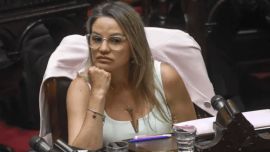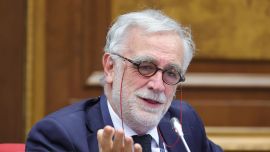Argentina has issued the clearest definition yet of its approach to the political and economic turmoil in Venezuela, distancing itself from a call for general elections and a transitional government from 31 nations.
On Friday, a large group of countries, including the United States, issued a message to “all Venezuelans,” calling on them to “urgently” commit a process that would establish "an inclusive transitional government that will lead the country to free and fair presidential elections as soon as possible."
The message was backed by the European Union, the International Crisis Group (ICG), the vast majority of Lima Groups members and other nations such as Israel and South Korea, who stressed the impact of the coronavirus pandemic meant the situation in Venezuela was more critical than ever.
"The current pandemic and the collapse of Venezuela's public health system have added urgency to the need to end the status quo," read a statement signed by 31 nations in total.
However, following a Lima Group video-conference call on Friday, Argentina’s Foreign Ministry distanced itself from the main call, issuing a separate statement declaring that “the electoral route is the only way to establish a consensual path in the Bolivarian Republic of Venezuela."
Venezuelan authorities have called December 6 elections for the National Assembly, the only government branch led by the opposition but which has been left powerless. Washington has warned those elections may be subject to fraud.
Crisis
Venezuela has been gripped by a deep political crisis for some time, though the situation escalated last year, in January 2019, when Nicolás Maduro assumed office for a second presidential term running until 2025.
The United States and most Western and Latin American nations no longer recognise Maduro as Venezuela’s legitimate leader, citing wide allegations of fraud in 2018 elections. More than 60 nations in total instead recognise opposition leader Juan Guaidó as the country’s only legitimate authority.
Nevertheless, Maduro remains in charge, with a new showdown set for December. Guaido's claim to power rests on being the National Assembly’s speaker, but the opposition fears that a new ballot under a regime-led electoral body is a foregone conclusion.
Shift
Argentina’s position on the crisis in Venezuela has shifted since the arrival of President Alberto Fernández in office last December. The Peronist leader has repeatedly stressed that dialogue and elections are the only way forward for the country.
Under previous president Mauricio Macri (2015-2019), Argentina was a strong critic of the Maduro government and one of the strongest supporters of Guaidó’s claim to power. The government even issued diplomatic credentials to the opposition leader’s preferred envoy to Buenos Aires.
The December elections have been slammed by most opposition parties in Venezuela, who have alleged the ballot will not be free and fair. Some leaders have called on voters to boycott the vote.
Argentina’s Foreign Ministry, however, rejected that position in its statement over the weekend, saying its delegation to the Lima Group “does not share the decision of the band of [Venezuelan] political parties that expressed their will not to participate in the parliamentary elections next December and call for abstention."
Boycotting the vote "would leave many Venezuelan citizens without the valid instrument to defend their rights in the National Assembly,” it argued. “Electoral non-participation will deepen the political-social divide in Venezuela and will marginalise important sectors of the citizenry so that they will be left without political representation."
– TIMES/AFP

























Comments